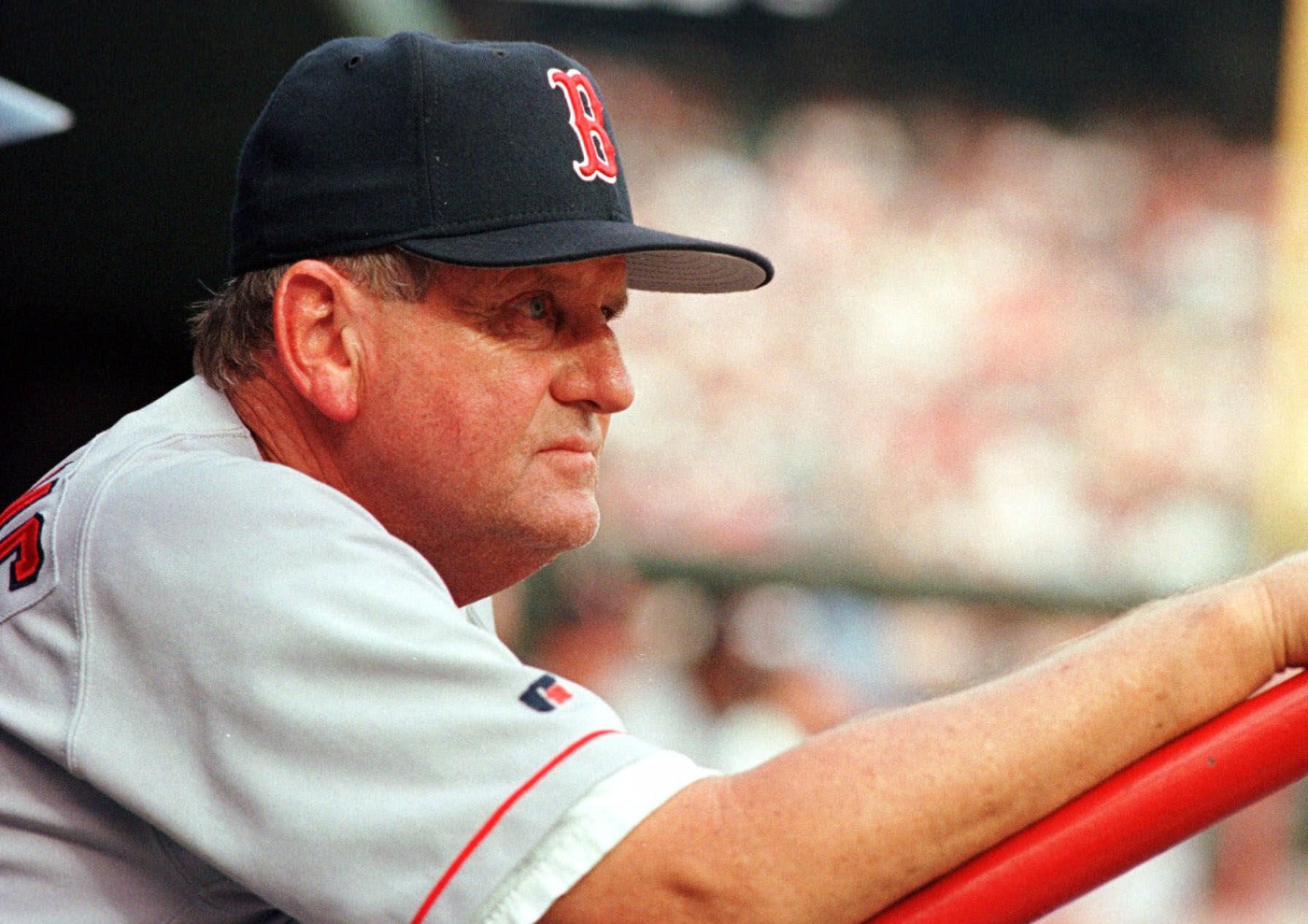
Jimy Williams, ’97-01 Red Sox manager and ultimate baseball coach, passes away
There was something very Forrest Gump-ian about former Red Sox manager Jimy Williams, who passed away on Friday at 80 years old after a brief illness.
Williams’ professional baseball career spanned five decades and included playing, coaching, or managing stints with a third of Major League Baseball’s 30 franchises, including championship seasons with the ’95 Braves and ’08 Phillies. Bobby Doerr scouted him, Sandy Koufax struck him out in his first big-league at-bat, Juan Marichal gave up his first big-league hit. Williams was teammates with Curt Flood and Lou Brock, played summer ball with Tom Seaver in Alaska, and was Fernando Valenzuela’s skipper in Mexican Winter League. He managed Nomar Garciaparra to Rookie of the Year and Pedro Martinez to his second and third Cy Young Awards, traded barbs with Yankees owner George Steinbrenner, and caused a United States president to run onto the field during a postseason game.
In the afterglow of 2004, 2007, 2013, and 2018, it’s easy to forget that Williams was instrumental in building the foundation; his late-90s Red Sox propelled Boston into a new millennium and eventual glory. And few remember that his connection to the Red Sox began decades earlier. They were his first professional organization, albeit briefly. A star infielder at Fresno State in the 1960s, the California native signed with Boston after graduation – Doerr and Glenn Wright were crediting with scouting him – but only played one season in their system before the Cardinals took him in the ’65 Rule 5 Draft. Over the next two seasons, he played all of his 14 career big-league games with St. Louis, but spent most of his playing time in the minors. (The Cardinals recalled him for one contest in September in ’67, technically making him a member of the team that destroyed Boston’s Impossible Dream the following month.)
Williams’ true impact on the Red Sox came almost exactly 30 years later. Williams returned to his first organization on November 19, 1996, having been hired by general manager Dan Duquette to replace ousted manager Kevin Kennedy.
The new skipper’s uniqueness and quirkiness were on display from his first day on the job. His Red Sox introductory press conference will forever be remembered for one line: “If a frog had wings, he wouldn’t bump his booty.” It was one of many perplexing aphorisms Williams spouted over the years.
Williams inherited a chaotic clubhouse. Duquette and Mo Vaughn had been feuding for years. The GM had also made a catastrophic error by saying that 33-year-old Roger Clemens was in “the twilight of his career.” The three-time Cy Young winner departed for Toronto, where he immediately got his revenge in the form of Cy Youngs No. 4 and No. 5 in ’97 and ’98, and two more with the ’01 Yankees and ’04 Astros.
After a third-place finish under Kennedy, the Red Sox fell to fourth in Williams’ first season. 1997 wasn’t all bad, though. A rookie pitcher named Derek Lowe and Jason Varitek, a catching prospect, arrived from Seattle in one of the most lopsided trades in baseball history. Williams, an infield coaching expert and excellent evaluator of talent, put his faith in a rookie shortstop from Day 1. Garciaparra took home AL Rookie of the Year; the Red Sox haven’t had one since.
Beginning in Williams’ second year, the Red Sox embarked on a stretch of consecutive winning seasons that would continue until 2012, the second-longest streak in franchise history (’67-82). With the arrival of reigning NL Cy Young Pedro Martinez from the Montreal Expos, Boston improved to 92-70 in ’98, their first time winning 90 or more games since 1986. The Red Sox owned the second-best record in the American League, so the wild card (still in its single-team format) was theirs, but they fell to Cleveland and a young slugger named Manny Ramirez in the first round.
The following season was one of the best in franchise history and Williams’ career. The Red Sox drafted his son, Brady (he’s now the Rays’ third-base coach) and Fenway Park hosted the legendary ’99 All-Star Game. The Red Sox went 94-68 and clinched the their second consecutive AL Wild Card. This time, Boston bested Cleveland in the ALDS, but fell to the Yankees in a five-game ALCS. Martinez had a Triple Crown season and won his second career Cy Young, and Williams was named American League Manager of the Year.
Williams was also part of some of the most heated moments in the history of the Red Sox-Yankees rivalry. During the ’99 ALCS, he was repeatedly frustrated with the umpires, who made multiple erroneous calls in the Yankees’ favor. By the late innings of Game 4, the Sox skipper’s frustrations boiled over; he threw his cap and got ejected. Fans began throwing garbage onto Fenway Park’s field, and the crew chief ordered the Yankees to return to their dugout for their own safety. Second-base umpire Tim Tschida later admitted to blowing call, which became known as “The Phantom Tag.”
Steinbrenner, already in his third decade as chief architect of the rivalry, accused Williams of fomenting a “near riot.”
“I never worry about Georgie Porgie. He’s never been in the trenches. When Georgie Porgie speaks, I don’t listen,” Williams said in response. “The calls on the field incited it, not me.”
If hiring Williams was one of Duquette’s best decisions, firing him was one of the worst. Their relationship had soured, in large part because the GM repeatedly sided with troublesome outfielder Carl Everett when he clashed with his manager. But when Duquette fired Williams late in the ’01 season, the team collapsed almost immediately.
“Until the clubhouse began to come apart this year, the Red Sox were a reflection of their manager — mentally tough, detail-oriented and conscientious,” wrote Richard Justice in the Houston Chronicle less than two months later. Williams already had a new job by then; Justice was writing about him because the Astros had named him manager on November 1.
Houston went 215-197 under Williams, then fired him the morning after he’d coached in the ’04 All-Star Game. Months later, the Astros were beaten by a fellow former team of his, the Cardinals, in the NLCS, but the victory was short-lived. It only took four World Series games for another one of Williams’ old teams to end their 86-year championship drought by beating the Cardinals in four games.
The Red Sox didn’t “reverse the curse” until three seasons after Williams’ firing – by then, their manager was the son of his former Cardinals teammate, Tito Francona Sr. – but his fingerprints were all over their historic triumph. His time in Boston amounted to a 414-352 regular-season record, and the club’s first back-to-back postseason appearances since their 1915 and 1916 championships, a sign that they were inching closer to long-awaited glory. What Williams was able to accomplish in Boston borders on remarkable when looked at in the broader context: the Red Sox were considering tearing down Fenway and the Yawkey Trust was about to sell the team to current ownership.
With a combination of straight-shooting, kindness, and exacting work ethic, Williams guided young players, including Garciaparra, Varitek, Lowe, through the minefields of Major League life. He managed big egos, and was particularly devoted to bench players. He had high standards, a hunger for baseball knowledge, and was determined to bring out the best in his players. He could be stubborn, and exacting, but was also kind, accommodating, and funny – he called himself “Peanut Head” – and known as a truly decent man. He stood up for his players, even against the front office, was almost universally respected.
“There’s no bull with Jimy,” Pat Gillick, Williams’ GM in Toronto, once told the Houston Chronicle. “He’s a stand-up guy. He’ll be up front with the players. They’ll know their roles. He’ll talk to them. They may not want to hear what he says, but they’ll respect him.”
“What I respect most about Jimy is that he’s like my father, he tells me not what I want to hear, but what I need to hear,” said Vaughn.
Not only was Williams content to be in the background, he preferred it. He was content to let Francisco Cabrera be the hero for his pinch-hit single in Game 7 of the ’92 NLCS, even though it was his gutsy decision as the Braves’ third-base coach to send Sid Bream from second to home for a walk-off victory. Among the elated fans who rushed the field was former president of the United States Jimmy Carter, who ran down the third-base line to shake Williams’ hand.
“The game is about the players,” was one of his mantras, and the way he went about his career proved that he truly meant it.
“I always believed that when we had Jimy, we were the most fortunate team in Major League Baseball,” said then-Braves GM John Schuerholz in 2001.
Major League Baseball was most fortunate to have Jimy Williams.


